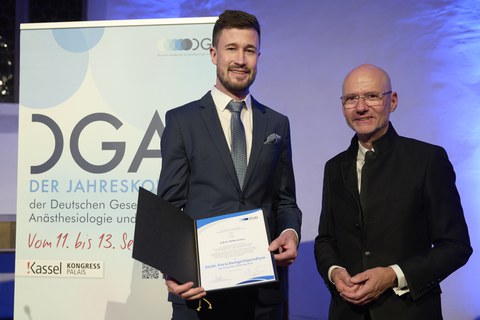Sep 26, 2024
DGAI awards 2024 Research Grant: Dr. Jakob Wittenstein honored for outstanding scientific work

Dr. Jakob Wittenstein und Prof. Benedikt Pannen (from left to right)
At the annual congress of the German Society for Anesthesiology and Intensive Care Medicine (DGAI), the DGAI Research Grant of the Fresenius Foundation 2024 was awarded to Dr. Jakob Wittenstein and Dr. Hauke Basedau. The grant, each worth 10,000 Euro, supports both basic and clinical research and recognizes outstanding scientific achievements in the field of anesthesiology and intensive care medicine.
Dr. Jakob Wittenstein was honored for his work on developing an artificial intelligence-based algorithm to optimize controlled ventilation for patients with acute respiratory distress syndrome (ARDS). The "IntelliLung" algorithm he developed uses historical patient data and a reinforcement learning model to adjust ventilation parameters individually, thereby reducing mortality and minimizing organ damage. His proof-of-concept study included both clinical and animal trials, demonstrating that the algorithm often selected lower oxygen and PEEP levels compared to conventional ventilation strategies, enabling more personalized ventilation.
Preventing lung injuries during mechanical ventilation
The development of the algorithm is part of an EU project "Intelligent Lung Support for Mechanically Ventilated Patients in Intensive Care (IntelliLung)," initially supported by the Else Kröner Fresenius Center for Digital Health and funded since 2022. Scientists from Dresden's university medical center, along with 13 international partners, are testing a decision support system for invasive ventilation of critically ill patients. Coordinated by TU Dresden, the clinical study is planned for five years and is funded with a total of 5.98 million Euro, of which 1.8 million Euro goes to Dresden. The aim is to further improve invasive ventilation for critically ill patients.
Optimizing mechanical ventilation is a complex process. Using ventilation pressures that are too high risks mechanical injury within the lungs. If the pressure at the end of exhalation is too low, the lung could collapse, making further ventilation difficult. "We are trying to bring together various ventilation parameters to ultimately create a digital decision support system for optimal ventilation," explains Dr. Jakob Wittenstein. "In the end, the goal is to minimize ventilation time, shorten the length of stay in intensive care, and reduce mortality," he summarizes. In addition to clinical and academic partners, two manufacturers of ventilator technology are involved in the project.
DGAI President Prof. Benedikt Pannen emphasizes the importance of recognizing scientific findings such as these: "The awarding of scientific prizes during the DGAI's annual congress plays a significant role in honoring outstanding scientific work in anesthesiology and intensive care medicine." This recognition is not only an acknowledgment of the researchers but also a motivation for the entire professional field to continue working on innovations and improvements.
Jakob Wittenstein studied medicine at TU Dresden and earned his doctorate in 2018. Since 2017, he has been a research assistant and resident at the Department of Anesthesiology and Intensive Care Therapy at the University Hospital Carl Gustav Carus Dresden. From 2020 to 2022, he was also a Clinician Scientist at the Else Kröner Fresenius Center for Digital Health.
Contact:
Dr. Jakob Wittenstein
University Hospital Carl Gustav Carus Dresden
Department of Anesthesiology and Intensive Care Therapy
